It’s hard to imagine that one of the world’s most famous Rock and Roll bands would actually steal a song from a 1963 recording by a little-known Detroit R&B vocal group for its first single, especially when that band contains a songwriter the caliber of Pete Townshend.
The record in question is “Misery” sung by The Dynamics with instrumental backing by a young Dearborn combo called The Royal Playboys. “Misery” was released in late 1963 on the Big Top label, and it peaked at # 44 on Billboard’sHot 100 shortly before the onslaught of The Beatles and the British Invasion.
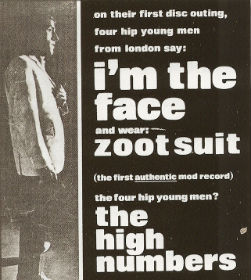 "Zoot Suit" by the High Numbers (The Who) plagiarized "Misery"The Who, with their classic line-up of Townshend, Roger Daltry, John Entwhistle, and Keith Moon, were calling themselves the High Numbers for several months in 1964 when they released their first single, “Zoot Suit” b/w "I'm The Face", on the Fontana label in Great Britain. Pete Meaden had been hired by The Who’s manager to help the group appeal to the emerging Mod subculture in Britain that was centered on fashion, motor scooters, amphetamines, and the music of American R&B and Soul, including the sounds of Tamla-Motown.
"Zoot Suit" by the High Numbers (The Who) plagiarized "Misery"The Who, with their classic line-up of Townshend, Roger Daltry, John Entwhistle, and Keith Moon, were calling themselves the High Numbers for several months in 1964 when they released their first single, “Zoot Suit” b/w "I'm The Face", on the Fontana label in Great Britain. Pete Meaden had been hired by The Who’s manager to help the group appeal to the emerging Mod subculture in Britain that was centered on fashion, motor scooters, amphetamines, and the music of American R&B and Soul, including the sounds of Tamla-Motown.
It was Meaden who convinced The Who to change their name to The High Numbers. ‘Number’ was a hip term for a Mod subgroup of lieutenants that rated below the fashion-leading 'Faces' in the movement. The ‘High’ referred to the pep pill-driven variety preferred by young Mods.
Pete Meaden, who was just 19, fashioned himself as a Mod and may have heard or was given a copy of “Misery” by DJ Guy Stevens of Britain’s first all-music pirate station, Radio Caroline. He then rewrote the lyrics to “Misery”, so that the song was now about trendy Mod fashion, and renamed it “Zoot Suit”. Meaden did the same thing with the flipside. In this case, he took Slim Harpo’s “Got Love If You Want It” and changed the words to make it into another song about the British Mod scene called “I’m The Face”. Meaden listed himself as the writer of both songs, not giving any credit to those who composed the original melodies.  Pete Meaden
Pete Meaden
Although The Who’s debut was a total flop, selling only 500 copies, it is an important recording by virtue of the Hall of Fame career of the band. And because there were only 1,000 copies pressed, the “Zoot Suit/I’m The Face” single is considered by many to be the most valuable collector’s item in The Who’s UK catalogue.
By the end of 1964, The High Numbers name had been jettisoned along with Pete Meaden, and the band had become The Who again under new management. After they signed with Decca Records, the band would rely on the songwriting prowess of Pete Townshend for the rest of its storied career starting with their first charting single, “I Can’t Explain”, in early 1965.
Unfortunately, neither the members of The Who, nor the record companies that have issued "Zoot Suit" and "I'm The Face" over the past fifty years have ever taken the time and effort to straighten out the writing credits for the two songs that Meaden plagiarized. As a result, this injustice has been perpetuated in a variety of books, websites, LPs, movie soundtrack recordings, CDs, and in a box set.
Andy Neil's and Matt Kent’s incredibly detailed coffee-table book, Anyway Anyhow Anywhere: The Complete Chronicle Of The Who 1958 – 1978, even gets it wrong. Although the authors correctly state that “I’m the Face” was appropriated from Slim Harpo’s “Got Love If You Want It”, they completely missed the boat when they claim that “Zoot Suit” was taken from “Country Fool”, the flipside of The Showmen’s 1962 hit single, “It Will Stand”.
The Who Official Band Website correctly credits “Misery” by The Dynamics as being the song that “Zoot Suit” was “based around” but again gives sole songwriting credit to Pete Meaden. The composer credits on the “Misery” single on Big Top incorrectly went to G. Stratton and A. Wilson, but neither of their names has ever appeared under “Zoot Suit” in any of recordings or websites connected to The Who. If Meaden simply rewrote the words, shouldn’t one or both of these songwriters be getting credit for the melody? Or better yet, how about the two people who really wrote "Misery"?
Then there is the matter of the money. Although their debut single sold poorly, “Zoot 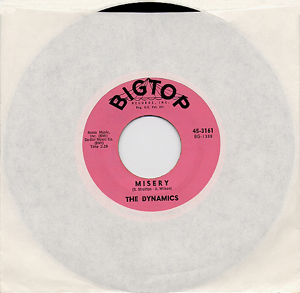 "Misery" 45 on Big TopSuit” appeared on the soundtrack for the hit film Quadrophenia and on The Who’s box set, “30 Years Of Maximum R & B”. In both of these cases the band’s name has generated massive sales around the world, yet whatever royalties have been earned by the inclusion of “Zoot Suit” appear to have gone to Pete Meaden's estate. (Meaden passed away in 1978.)
"Misery" 45 on Big TopSuit” appeared on the soundtrack for the hit film Quadrophenia and on The Who’s box set, “30 Years Of Maximum R & B”. In both of these cases the band’s name has generated massive sales around the world, yet whatever royalties have been earned by the inclusion of “Zoot Suit” appear to have gone to Pete Meaden's estate. (Meaden passed away in 1978.)
In fairness to The Who, it seems that the idea to appropriate “Misery” for the band’s first single was all Pete Meaden’s. In an interview with Barbara Charone in 1974, Meaden explained: “I had this dream of getting a group together that would be the focus, the entertainers for the Mods.” After dressing the band in Mod gear such as skating jackets, T-shirts, jeans with one-inch turn-ups, and boxing boots; his next step was coming up with a single that reflected the Mods’ fascination with American R&B.
In a 2009 submission to the blog Funky 16 Corners, Morgan Young reported that Pete Townshend said that he never heard the original recording of “Misery” by The Dynamics and The Royal Playboys. Young also claimed that Townshend revealed that it wasn’t him playing lead on the recording of “Zoot Suit”, but rather a session musician. Townshend tells a different story, however, in his 2012 autobiography Who I Am. There he writes: "On 'Zoot Suit', which was based on 'Misery' by The Dynamics, I play weedy jazz guitar, demonstrating that my solo work was undeveloped."
Even though it appears that Pete Meaden was most responsible for this first single and the plagiarism involved, it also seems clear that surviving Who members Pete Townshend and Roger Daltry have done little to rectify the situation.
I have provided youtube links to both “Misery” by The Dynamics and “Zoot Suit” at the end of this article. It will become abundantly clear after listening to both that “Misery” was the source. A careful listen will also reveal that the young members of The Who, as well as any session musicians who might have been present, copied the arrangement and the instrumental licks of the Royal Playboys. The Michigan musicians have never been given credit for their part in what became the first Who single and, like the true composer of the song, they’ve not been compensated financially.
The Royal Playboys formed in Dearborn, Michigan. Located southwest of Detroit via Michigan Avenue, Dearborn was most noted for its brick bungalow homes and the headquarters of the Ford Motor Company. The city was also famous for its controversial mayor Orville Hubbard, one of the most outspoken segregationists in Michigan. Hubbard served as mayor of Dearborn from 1942 to 1978 and his administration aggressively discouraged blacks from residing in the city.
The Royal Playboys band was started by bassist and trumpet player Mike Hedgi in East Dearborn, the area of the city with strong Italian, Polish, and Arabic ethnic ties. The teens in the band all attended Fordson High School and were inspired by The Royaltones, local Rock and Roll heroes who had a # 17 hit on Billboard in 1958 with their catchy instrumental “Poor Boy”.
Besides Hedgi, the first line-up included drummer Lou Guido, along with Stan Petriw on sax and clarinet, guitarists Jim Wyjecka, Von Dragan, and Hank Rivera, and Stan Topij on accordion and organ. Other later members of The Royal Playboys included Al Siwarski on guitar, Ron (Jerry) Hubbard on trumpet, and Mike Adams on drums.
According to Stan Petriw, he suggested the Royal Playboys band name to Mike Hedgi, inspired by a treasured copy of Playboy magazine that he kept hidden from his parents in the attic of his Dearborn home.
Early band rehearsals were held in Hank Rivera’s home in Dearborn. Mike Hedgi’s father served as the band’s manager and agent, and he drove the young band to many of their engagements in his station wagon. 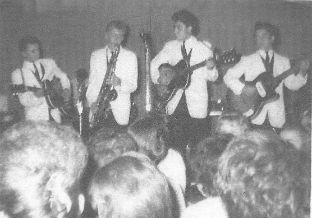 Royal Playboys: Von Dragon, Stan Petriw, Hank Rivera, Mike Hedgi
Royal Playboys: Von Dragon, Stan Petriw, Hank Rivera, Mike Hedgi
One of the band’s important early gigs was at St. Christopher’s Parish in Detroit. It was located across from Herman Gardens, a low income housing project at the intersection of Joy Road and Southfield. The church held weekly dances in its gymnasium that drew hundreds of kids and featured live music from several bands on a raised stage at one end of the auditorium. Al Siwarski remembers that The Royal Playboys looked cool in dark blue tuxedos with pyramid ties and would move in step with the music they were performing. It was at one of these dances that they were first seen by members of The Dynamics.
Siwarski also recalled the night when the band’s showmanship at St. Christopher’s almost got them into a brawl. Sax man Stan “Stosh” Petriw liked to jump off the stage into the crowd to blow his solos, and on one occasion he accidentally kicked an audience member in the jaw. The guy got mad and rounded up a few friends to get even with the band. The Royal Playboys had to sneak out of the gym that night to avoid a fight.
At first glance, it would seem unusual that a black vocal group would want to pair up with an all-white band from Orville Hubbard’s constituency. According to Al Siwarski, one of the factors in The Dynamics’ interest in having the Royal Playboys back them live and in recording sessions had to do with the difficulty that black artists in Detroit had at that time in getting their records on the air. WCHB-AM was the only black radio station in the early 60’s, and it was thought that having a mixed race grouping might make it easier to get airplay on the major Metro Detroit stations. 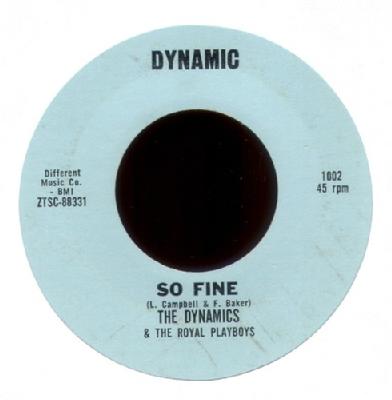
The Royal Playboys were soon booked in all the major venues in and around Metro Detroit. They played the The Club Gay Haven, the Thunderbowl Arena, the Island Lake Roller Rink, and they were on the same bill with Roy Orbison at Detroit’s Redford High School.
Petriw recalled that the band played high school dances hosted by DJ Robin Seymour at Dearborn Divine Child, and appeared around Detroit with many other nationally-known recording artists including The 4 Seasons (featuring Frankie Valli), Jack Scott, The Rocky Fellers, and Paul Anka. Siwarski added that that The Royal Playboys often played dances with popular Detroit deejays Lee Alan, Dave Prince, and Joel Sebastian for free in order to get radio airplay and for the promotional value that the gig provided.
The band also played many memorable gigs along with black artists. These included appearing with Marvin Gaye at the Walled Lake Casino and backing The Dynamics at the 20 Grand night club in Detroit where they opened for Joe Tex. The Royal Playboys shared the stage with Chuck Berry, Martha & The Vandellas, The Miracles, and The Temptations. In addition, they provided the instrumental backing for Little Stevie Wonder during his very first performance as a Motown artist at a roller rink in Brighton, Michigan, in 1962.
According to Stan Petriw, the first recordings that The Royal Playboys did with the Dynamics were “Delsinia” b/w “So Fine”, released on the Dynamic Sound label in Detroit. The songs were credited on the record label as by The Dynamics (with The Royal Playboys). Siwarski recalled that Dynamic Sound was one of the many small record companies that used to be located in Detroit.
“Misery” and “I’m The Man” were recorded in 1963 at the United Sound studio in Detroit by Fox Records, one of the city’s independent labels with an office on West Grand Blvd. The recording facility was used by most of the city’s tiny companies; the exception being Fortune Records which had its own primitive studio. Berry Gordy Jr. used United Sound to record all of his early Motown releases before putting together Motown’s famous Studio A at the Hitsville U.S.A. headquarters during the early 60’s.
Because Lou Guido had broken his leg, Joe Cyers was brought in to fill the drum seat at the session. Cyers had first met the Royal Playboys at Jim Wyjecka’s house in Dearborn. He had been performing with guitarist Cliff Bramlett as a duo called Cliff & Joe. After rehearsing with The Royal Playboys, Cyers brought Bramlett along to the recording session at United Sound. 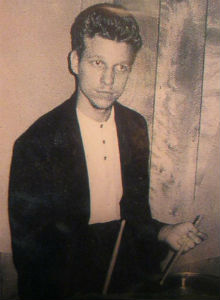 Joey Cyers
Joey Cyers
Six songs were recorded during the session that was engineered by Danny Dallas. “Misery” and “I’m The Man” were recorded first, and featured vocals by The Dynamics and instrumental backing by the Royal Playboys in a line-up that included Cyers and Bramlett. Next, were two instrumentals written by Cliff Bramlett: “Goodbye Bo” and “Happy Hour”. The last two tracks to be put on tape included “Don’t You Realize”, a song written and sung by Joe Cyers and “Tossin’ And Turnin’” featuring Cliff Bramlett singing lead. The Dynamics provided the backing vocals on both songs.
Following the session, Fox label owner George Braxton cut a deal, most likely with Embee Productions, whereby the single would be released nationally on Big Top Records out of New York. There is still some bitterness over the way things were handled. Cyers and Bramlett were paid the union scale of $52 for the session, but the other musicians chose to be paid royalties. Looking back nearly fifty years later, Al Siwarski recalled that everyone else at the session ended up with empty pockets: “There were promises made, but Fox sold the rights to Big Top and the management at Fox took the money and ran; even the Dynamics lost out”.
“Misery” was issued on Big Top in the fall of 1963 and quickly became a major hit in Detroit. The song spent all of November in WKNR’s Top 10 on the station’s Classic Top 30 Survey and did not finally drop off the chart until the following month. The song also did reasonably well nationally, spending a total of 10 weeks in the Billboard Hot 100 and peaking at # 44. “Misery” was the first record by the Dynamics to chart in Billboard and it would be the biggest Pop hit of their career.
In addition, "I'm The Man", the rocking flipside of "Misery", became a local hit in Detroit. The songwriting credits for "I'm The Man" listed G. Stratton, A. Wilson, and F. Baker.
The Royal Playboys’ single, “Goodbye Bo” b/w “Happy Hour” was released on the DoDe label in early 1964. The instrumental would prove to be the only hit 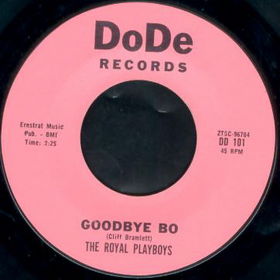 Cliff Bramlett's "Goodbye Bo"record released by The Royal Playboys. It was a hit in Detroit spending four weeks on WKNR’s Classic Top 30 peaking at # 18, and one week at # 29 on CKLW’s Big 30 Survey.
Cliff Bramlett's "Goodbye Bo"record released by The Royal Playboys. It was a hit in Detroit spending four weeks on WKNR’s Classic Top 30 peaking at # 18, and one week at # 29 on CKLW’s Big 30 Survey.
The band parted ways following the release of its lone single. Petriw and Siwarski then put together a group that had a steady weekend gig for several months at The Village, Detroit’s hot new music club located on Woodward Avenue. It was there that they backed a young Mitch Ryder who was performing at that time as Billy Lee, both as solo artist and also with a black vocal group called The Peps.
The Dynamics’ follow-up to “Misery” on the Big Top label in 1964 was “I Wanna Know” b/w “And That’s A Natural Fact”. The Royal Playboys were not used on the session because they were busy promoting "Goodbye Bo". As a result, the magic that infused the recordings of “Misery” and “I’m The Man” was sorely lacking, and the single sank like a stone soon after its release.
According to original member Fred "Sonny" Baker, The Dynamics was an R&B quintet made up of himself, Starling Schafer, Lorenzo Campbell, Samuel Stevenson, and George White. Despite a phone conversation with Al Siwarski in which he claimed that the two songwriters listed for “Misery”, G. Stratton and A. Wilson, were both members of The Dynamics back in 1963, Baker stated that George "Ernie" Stratton was the Dynamics' manager; and that Anthony Wilson was their voice coach. Baker said that somehow the credits were listed incorrectly on the record labels resulting in their manager and vocal coach being given undeserved songwriting credits on both sides of the single. Baker vows that he and Warren Tippett wrote "Misery" and that Baker wrote "I'm The Man" on his own.
Sometime during the early 60’s The Dynamics signed with Embee Productions, run by Detroiters Irv Micahnik and Harry Balk. The pair formed their company in 1959. Many of the acts signed to Embee ended up on Big Top Records, including Del Shannon, Johnny and The Hurricanes, The Young Sisters, Jamie Coe & the Gigolos, and the aforementioned Dynamics.
The group would record only two singles for Big Top. According to David A. Carson’s book Grit, Noise, And Revolution, “some Embee artists complained about the unfair contracts, low percentages, and missed royalty payments”. It’s possible that The Dynamics left the company over disputes that were sadly typical of Micahnik’s and Balk’s operation.
The following year, The Dynamics reunited with Joe Cyers for a single on the Top Ten label. Cyers co-wrote “Love To A Guy” which was backed with “Whenever I’m Without You”. The songs were recorded at Ernstat Recording on Livernois in Detroit, but the single failed to chart following its release in 1965. The Dynamics recorded a second single for Top Ten later in the year, "Yes I Love You Baby" backed with "Soul Sloopy". Fred "Sonny" Baker said that both of the Top Ten records were distributed nationally by Laurie.
The Dynamics' next stop was at RCA. Baker said that the group recorded three singles at the label in 1966 and 1967 but none charted. By this time, Starling Schafer had been drafted into the Army and was replaced by Isaiah Harris.
Later in the decade, The Dynamics came under the management of Ted White, the husband of Aretha Franklin. White helped to get the group a contract with Cotillion Records, and they recorded an album called “First Landing” at the American Studios in Memphis. The LP produced two Billboard R&B hit singles in 1969: “Ice Cream Song” and “Dum-De-Dum”.
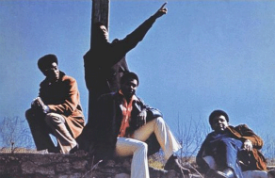 The Dynamics 1973
The Dynamics 1973
The group, now a quartet composed of Stevenson, Baker, White, and Harris, went on to record the “What A Shame” album for the Black Gold label in 1973. The Dynamics’ last appearances on Billboard’s R&B Chart were for the singles: “What A Shame” and “Funky Key” in 1973, and “She’s For Real (Bless You)" in 1974.
The Dynamics' final recordings were on the Columbia label. Following that, Samuel Stevenson went into the ministry, Fred "Sonny" Baker joined a gospel group, George White moved to Columbus, Ohio, and Issac "Zeke" Harris went solo as a blues performer. Original members Starling and Lorenzo Campbell are deceased.
Over the years, The Dynamics’ recording of “Misery” has achieved cult status. It has become a popular example of Northern Soul, a music and dance movement that is centered around a particular kind of black American soul music based on a heavy beat and a fast tempo. Northern Soul emerged from the British Mod scene and remains popular around the world today.
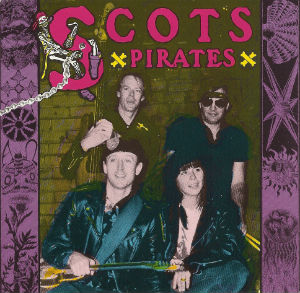 Scott Morgan's band overed both "Misery" and "I'm The Man"
Scott Morgan's band overed both "Misery" and "I'm The Man"
Scott Morgan, formerly of The Rationals (2010 Michigan Rock and Roll Legends Hall of Fame inductees), covered both “Misery” and its flip “I’m The Man” on his “Scots Pirates” CD on Schoolkids’ Records in 1993.
In the November 21, 2007 issue of the Metro Times, the publication’s staff listed The 100 Greatest Detroit Songs Ever! Perched at # 21 between “Cloud Nine” by the Temptations and “The Tears Of A Clown” by Smokey Robinson & The Miracles was “Misery” by the Dynamics. Unfortunately, the writers wrongly claimed that The Dynamics were “originally from Dearborn", and then failed to mention Pete Meaden when they stated that The Who pilfered “Misery” while “scrounging around for material for their first single”.
The Metro Times ended the piece on a very strong note, however, when they proclaimed: “The Dynamics were a Detroit favorite whose garage-style take on doo-wop and soul has proved enduring. While rock ‘n roll fans the world over still love “Misery”, which sounds absolutely like nothing else (despite the Brit cover), only true Who devotees recall “Zoot Suit”.
In 2012, the original recording of "Misery" by The Dynamics was voted a Legendary Michigan Song.
Despite the continued popularity of "Misery", the inaccurate songwriting creidts persist with G. Stratton and A. Wilson getting undeserved credit for writing both "Misery" and "I'm The Man" and Pete Meaden getting credit and royalties for his "Zoot Suit" rip-off. Although Fred "Sonny" Baker gets some checks for airplay royalties from BMI every once in a while that range from $25 to $40, he says he's "never received a dime from The Who."
While interviewing Baker, he said that when he first found out about The Who's recording, he was "really ticked off" and, although angry, he just said "the hell with it". Fred Baker is retired and his main source of income is Social Security. He works as a volunteer at the Plymouth Educational Center in Detroit tutoring 7, 8, and 9-year-old students in basic math, reading, and spelling. He doesn't have the money needed to hire an entertainment lawyer skilled enough to look into the royalty situation surrounding The Who's use of "Misery" in their recording of "Zoot Suit". He also said that he doesn't expect that the surviving members of The Who will rectify the situation: "They knew what they were doing when they did what they did; and they didn't feel guilty then, why should they feel guilty now?"
 The Who 2014 Tour
The Who 2014 Tour
I’m hopeful that this story will not only help clear up some of the misinformation surrounding “Misery” and the role the recording played in the career of The Who, but will also serve as an impetus for the band to correct any injustices that have resulted from Pete Meaden’s plagiarizing the song for “Zoot Suit”. It certainly couldn’t be that big of a task for Townshend and Daltry. I’m sure they have a large staff that deals with a wide variety of issues concerning The Who.
How much time and money would it take to put everything right? It could take a while to unravel it all after fifty years, but I’m guessing that whatever the cost, it would most certainly be a drop in the bucket for millionaires like Pete Townshend and Roger Daltry who are currently raking in a load of cash on their Who Hits 50! tour.
Maybe more importantly, it should be done in the true spirit of Rock and Roll. The music has always had a core of idealism and integrity, despite the fact that so many people who produced some of the best of it have been screwed over the years in one way or another. This might be an excellent opportunity to turn one such instance around.
YOU BE THE JUDGE: Decide for yourself whether or not Pete Mearden plagiarized “Misery” for the “Zoot Suit” single by listening to both records.
Listen to the 1964 recording of “Zoot Suit” by The High Numbers (The Who).

